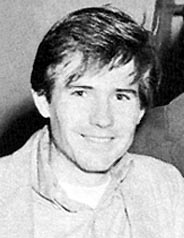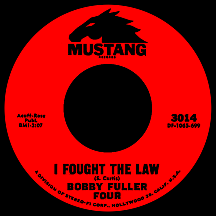BOBBY FULLER FOUR
I Fought the Law
Rock and roll was the goal for Randy and Bobby Fuller, the Baytown, Texas brothers who spent their adolescent years in Salt Lake City. In 1956, around the time Elvis began his domination of the music world, the Fuller family returned to the Lone Star State, settling in El Paso. 14-year-old Bobby had picked up on the hard-pounding rock piano techniques of the day while also becoming reasonably adept as a drummer. Randy, a few years older, focused on playing guitar. Many of their practice sessions on the family reel-to-reel recorder were destined for posterity. Not long after, fellow Texan Buddy Holly (of Lubbock) became a major star and the teenage brothers figured they, too, had the chops to make it; early on, they fantasized about stardom as Captain Fuller and the Rocket Squad, a band name destined for abandonment.
Tape machines were sturdy in those days and that particular recorder received more than its share of wear and tear as the two practiced, laid down tracks, erased, wrote more songs, hit play/record and went at it again. Bobby (who had become a solid guitar player by the early '60s) and Randy were confident enough to approach some of the smaller regional labels with what they considered their better demos. A 100-mile road trip up highway 54 resulted in the late 1961 release of "You're in Love" by Alamagordo, New Mexico's Yucca Records, credited to Bobby Fuller (lead singer on the track). The song and its flip, "Guess We'll Fall in Love," left little doubt as to the heavy Crickets influence; Bobby's fascination with Buddy, nearly three years after the iconic singer's death, ran deep and would leave its stamp on many future Fuller efforts.
The record wasn't what you'd call a hit...unless you lived in El Paso, where it was played frequently on local station KELP. The door had been opened for the Fuller brothers to make another record. This time they went straight to the source of their inspiration, beyond Alamagordo, past Roswell, further northeast to Clovis, New Mexico and the Norman Petty studios where Holly had made his historic recordings. "My Heart Jumped," the more polished second single, was also released by Yucca. They set up a recording studio at home with the approval of mom and dad (who were cooler than your parents or mine) and put out a single on their own Eastwood label (named after Eastwood High School in El Paso). Holly's "Not Fade Away" was one of the songs, though in spite of strong musicianship and improved acoustics, it came off more along the lines of a cheapo Tops label knockoff. Back to the drawing board, guys!
Bobby had taken on regular lead guitar duties as Randy settled in on bass; Jim Reese came on board as rhythm guitarist and Dalton Powell became their band's drummer. They played around with different group names but couldn't decide on a permanent one. "Saturday Night," a Todd label single in 1963 (still under the Bobby Fuller name), imitated Eddie Cochran's "Summertime Blues" to the point of embarrassment, but the flip side, "The Stinger," was a strong surf-style instrumental and gave them a foothold in a much more contemporary arena. On a trip to Los Angeles in 1964, they met with indifference from several record labels but received encouragement from Del-Fi Records owner Bob Keane. Bobby, back in his South Texas comfort zone, opened an all-ages club in El Paso called the Teen Rendezvous (with financial backing from his parents) while the band waxed three singles for Exeter Records including "I Fought the Law" ('...and the law won'...of course!), a no-nonsense rock song written by Sonny Curtis and first recorded in 1961 by Curtis's post-Holly Crickets.

The band signed with Keane late in the year; DeWayne Quirico replaced Powell, who'd married and started a family in El Paso. Loraine Fuller drove out west in her Oldsmobile to give her sons moral support and often stayed for long periods. Bobby Fuller and the Fanatics had finally been decided on as the group's name (they'd used it on the third Exeter single); the hot surf instro "Our Favorite Martian" (having no connection to the hit CBS-TV series My Favorite Martian starring Ray Walston and Bill Bixby) was the band's debut on Donna, a Del-Fi subsidiary. Keane attempted another blatant television tie-in gimmick, billing them as The Shindigs (after ABC's rock and roll music series of the same title) on another instrumental surf tune, "Thunder Reef," establishing a new label, Mustang, in the process. Then he announced that the band would henceforth be known as Bobby Fuller Four, a decision not popular with Reese or Quirico, but accepted in view of the contracts that called for an even four-way split of all royalties.
"She's My Girl" was the first single under the new group name; as with the others, it was not a hit. In a fortunate turn of events, KRLA disc jockey Casey Kasem took a liking to the band and booked them for many of the dances he sponsored while Keane made a deal with the station to release an album by the group titled KRLA King of the Wheels, tying them into the Southern California drag race scene while providing guaranteed promotional exposure. They also began making regular appearances at P.J.'s nightclub in West Hollywood (where Trini Lopez had made a name for himself a couple of years earlier).
The hoped-for hit finally came with "Let Her Dance," released first on Mustang in the summer of '65 and then a short time later by the larger Liberty Records, though what type of wrangling was done (with or without Keane's cooperation) is uncertain. An exuberant, uptempo number with an overtly Californian surf-and-drag feel (taking the group further from their Texas roots than ever before), it went top 20 in Los Angeles, yet failed to connect beyond a few west coast cities. The big national smash happened a few months later, at the beginning of 1966, with a rerelease on Mustang of the Exeter 45 from '64, "I Fought the Law." This time it garnered airplay on stations from coast to coast and hit the national top ten in March.
An appearance in the cheesy, ultra-low-budget film The Ghost in the Invisible Bikini, filmed months earlier, hit theaters that spring; the band joined Nancy Sinatra on a tune called "Geronimo," but it's widely believed they were lip-syncing a studio backup group's vocals. Follow-up single "Love's Made a Fool of You," another Crickets track written by Bob Montgomery and Buddy Holly, reached the top 30 in May '66. The Bobby Fuller Four had arrived. The next single, Ted Daryll's "Magic Touch" (a song Bobby felt was out of touch with his signature sound), started getting played on L.A. stations in July; Bob Keane, at least, felt positive about its hit potential. As it turned out, it was the last new record by the group that would ever get any degree of radio exposure.
On July 18, Bobby Fuller's lifeless body was found near his Hollywood apartment, in the front seat of his mother's Oldsmobile with the windows rolled up. An open gas can was inside the car, leading investigators to link the cause of death to the inhalation of gasoline, yet others who witnessed the scene testified that he appeared beaten and bruised. The police were inclined to dismiss the case as a suicide, yet those close to him insisted the 23-year-old had no cause to take his own life. Within days, rumors of a mob connection emerged and even police corruption was suspected (transforming the lyrics of "I Fought the Law" into a bizarre coincidence). Abrupt and shocking, the entire incident was shrouded in mystery and to this day remains unsolved. Bob Keane sought to keep the group going as the Randy Fuller Four, but without Bobby it seemed pointless. He was the Bobby Fuller Four. After a brief attempt, band members decided they were unable to go on without him.


